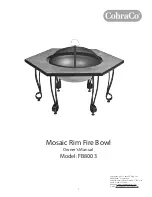
18
TABLE 4
Minimum Free Area of Permanent Openings for Ventilation
and Combustion Air Supply - All Air from Outdoors Only.
Based on total BTUH input rating for all utilizing equipment
within the con
fi
ned space.
Opening Source
Minimum Free Area
Per Opening (sq. in.)
Reference
Drawing
*Direct to outdoors
1 sq. in, per 4000 BTUH
Figure 14
Vertical Ducts
1 sq. in, per 4000 BTUH
Figure 15
Horizontal Ducts
1 sq. in, per 2000 BTUH
Figure 16
Single Opening
1 sq. in, per 3000 BTUH
Figure 17
Example: A water heater with an input rating of 50,000 BTUH using
horizontal ducts would require each opening to have a minimum free
area of 25 square inches.
Minimum free area = 50,000 BTUH x 1 sq. in. / 2000 BTUH = 25 sq.
in.
*
These openings connect directly with the outdoors through a
ventilated attic, a ventilated crawl space, or through an outside
wall.
Consult the local codes of your area for specific ventilation and
combustion air requirements.
GABLE VENT
TO OUTDOORS
INSTALL ABOVE
INSULATION
CONFINED
SPACE
ALTERNATE
AIR INLET
OUTLET
AIR TO
ATTIC 1 SQ.
INCH PER
4000 BTUH
INLET AIR FROM
THE CRAWL SPACE
OPEN
FOUNDATION
VENT
1 SQ. INCH PER
4000 BTUH
ALL AIR FROM OUTDOORS: INLET AIR FROM VENTILATED
CRAWL SPACE/OUTLET AIR TO VENTILATED ATTIC
FIGURE 14.
GABLE VENT
TO OUTDOORS
INSTALL ABOVE
INSULATION
CONFINED
SPACE
OUTLET AIR
TO ATTIC
1 SQ. INCH
PER 4000
BTUH
INLET AIR DUCT
1 SQ. INCH PER
4000 BTUH
12” MAXIMUM
ALL AIR FROM OUTDOORS THROUGH VENTILATED ATTIC
FIGURE 15.
gas utilization equipment in the area. If you are unsure that the
structure meets this requirement, contact your local gas utility
company or other qualified agency for a safety inspection.
Each of the two openings shall have a minimum free area of 1
square inch per 1,000 BTUH of the total input rating of all gas
utilization equipment in the confined area, but not less than 100
square inches (Figure 13).
CONFINED
SPACE
PERMANENT
OPENINGS
1 SQUARE
INCH/1000
BTUH
(MINIMUM
100 SQ. IN.)
FIGURE 13.
All Air from Outdoors
Outdoor fresh air can be provided to a confined area either
directly or by the use of vertical and horizontal ducts. The
fresh air can be taken from the outdoors or from crawl or attic
spaces that freely communicate with the outdoors. Attic or crawl
spaces cannot be closed and must be properly ventilated to the
outside.
Ductwork must be of the same cross-sectional area as the
free area of the opening to which they connect. The minimum
dimension of rectangular air ducts cannot be less than three
inches.
The size of each of the two openings is determined by the
method in which the air is to be provided. Refer to Table 4 to
calculate the minimum free area for each opening. Figures 14,
15, 16 and 17 are typical examples of each method.
Louvers and Grilles
In calculating free area for ventilation and combustion air supply
openings, consideration must be given to the blocking effect
of protection louvers, grilles, and screens. These devices can
reduce airflow, which in turn may require larger openings to
achieve the required minimum free area. Screens must not be
smaller than 1/4” mesh. If the free area through a particular
design of louver or grille is known, it should be used in
calculating the specified free area of the opening. If the design
and free area are not known, it can be assumed that most wood
louvers will allow 20 - 25% of free area while metal louvers and
grilles will allow 60 - 75% of free area.
Louvers and grilles must be locked open or interconnected with
the equipment so that they are opened automatically during
equipment operation.
Keep louvers and grilles clean and free of debris or other
obstructions.
















































